Appraisal ch1 - Study guides, Class notes & Summaries
Looking for the best study guides, study notes and summaries about Appraisal ch1? On this page you'll find 16 study documents about Appraisal ch1.
Page 2 out of 16 results
Sort by
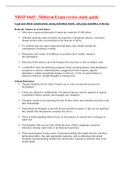
-
NRNP 6645 - Midterm Exam review study guide
- Exam (elaborations) • 52 pages • 2023
-
- $9.99
- + learn more
NRNP 6645 - Midterm Exam review study guide Legal and ethical considerations among individual, family, and group modalities of therapy Domestic violence & sexual abuse: • Most states require professionals to report any suspicion of child abuse. • Although reporting suspected abuse can jeopardize a therapeutic alliance, sometimes therapy needs to take a second place to the interests of safety. • If a clinician does not report suspected child abuse, they should consider the cons...
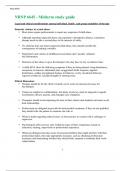
-
NRNP 6645 - Midterm study guide
- Exam (elaborations) • 59 pages • 2023
-
- $14.59
- + learn more
NRNP 6645 - Midterm study guide Legal and ethical considerations among individual, family, and group modalities of therapy Domestic violence & sexual abuse: • Most states require professionals to report any suspicion of child abuse. • Although reporting suspected abuse can jeopardize a therapeutic alliance, sometimes therapy needs to take a second place to the interests of safety. • If a clinician does not report suspected child abuse, they should consider the consequences of ...
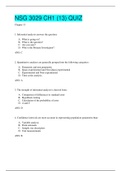
-
NSG 3029 CH1 (13) QUIZ | VERIFIED ANSWERS
- Exam (elaborations) • 3 pages • 2021
- Available in package deal
-
- $12.49
- + learn more
NSG3029 CH1 (13)NSG 3029 CH1 (13) QUIZ Chapter 13 1. Inferential analysis answers the question: A. What is going on? B. What is the question? C. Are you sure? D. Who is the Primary Investigator? 2. Quantitative analyses are generally grouped into the following categories: A. Parametric and non parametric B. Quasi-experimental and Non-Quasi-experimental C. Experimental and Non-experimental D. Time-series analysis 3. The strength of inferential analysis is derived from: A. Co...
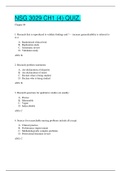
-
NSG 3029 CH1 (4) QUIZ. | 100% CORRECT
- Exam (elaborations) • 3 pages • 2021
- Available in package deal
-
- $8.99
- + learn more
NSG 3029 CH1 (4) QUIZ.NSG 3029 CH1 (4) QUIZ. Chapter 04 1. Research that is reproduced to validate findings and *— increase generalizability is referred to as a: A. Randomized clinical trial B. Replication study C. Systematic review D. Validation study 2. Research problem statements: A. Are declarations of disparity B. Are declarations of intent C. Declare what is being studied D. Declare who is being studied 3. Research questions for qualitative studies are usually: A...
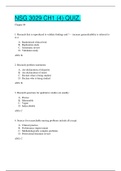
-
NSG 3029 CH1 (4) QUIZ | VERIFIED SOLUTION
- Exam (elaborations) • 3 pages • 2021
- Available in package deal
-
- $10.49
- + learn more
NSG 3029 CH1 (4) QUIZ. Chapter 04 1. Research that is reproduced to validate findings and *— increase generalizability is referred to as a: A. Randomized clinical trial B. Replication study C. Systematic review D. Validation study 2. Research problem statements: A. Are declarations of disparity B. Are declarations of intent C. Declare what is being studied D. Declare who is being studied 3. Research questions for qualitative studies are usually: A. Precise B. Measurable C. ...
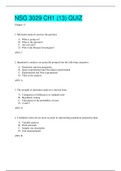
-
NSG 3029 CH1 (13) QUIZ | UPDATED ANSWERS
- Exam (elaborations) • 3 pages • 2021
- Available in package deal
-
- $10.49
- + learn more
NSG 3029 CH1 (13) QUIZ Chapter 13 1. Inferential analysis answers the question: A. What is going on? B. What is the question? C. Are you sure? D. Who is the Primary Investigator? 2. Quantitative analyses are generally grouped into the following categories: A. Parametric and non parametric B. Quasi-experimental and Non-Quasi-experimental C. Experimental and Non-experimental D. Time-series analysis 3. The strength of inferential analysis is derived from: A. Comparison of differenc...

$6.50 for your textbook summary multiplied by 100 fellow students... Do the math: that's a lot of money! Don't be a thief of your own wallet and start uploading yours now. Discover all about earning on Stuvia


